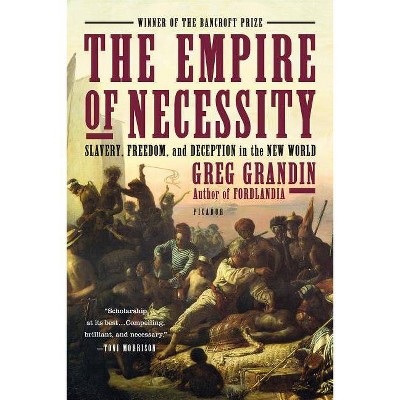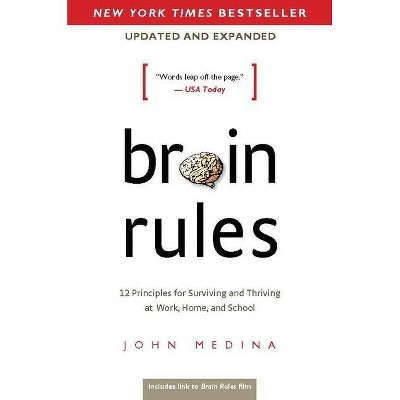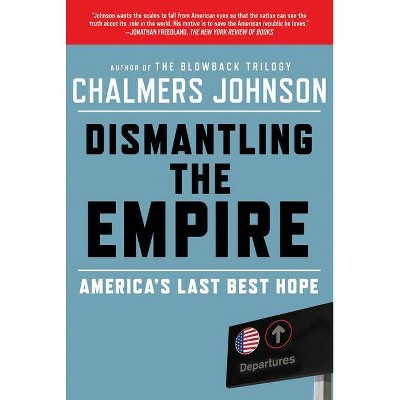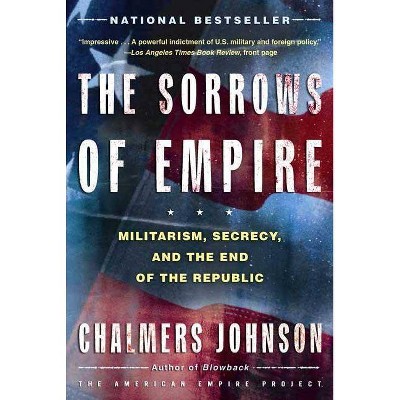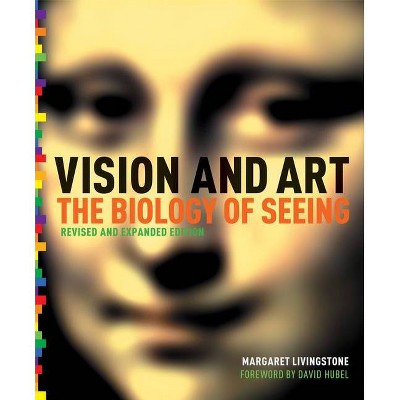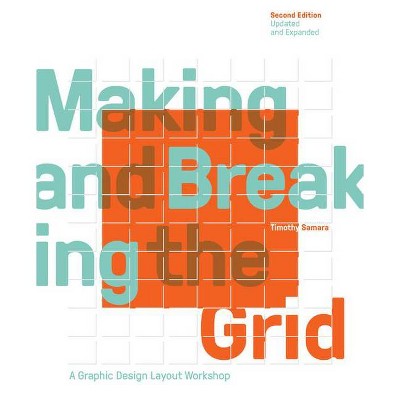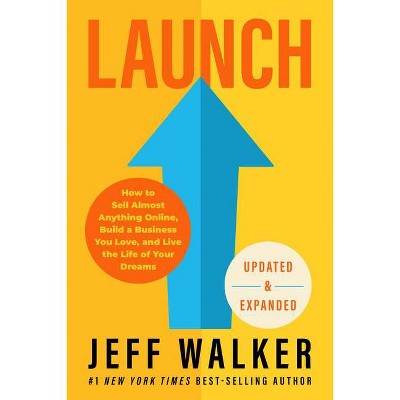Empire's Workshop (Updated and Expanded Edition) - (American Empire Project) by Greg Grandin (Paperback)

Similar Products
Products of same category from the store
AllProduct info
<p/><br></br><p><b> Book Synopsis </b></p></br></br><p><b>"A pathbreaking work about how policies forged in blood and fire in Latin America were then exported to every corner of the globe. This brilliant and up-to-the-minute new edition is absolutely crucial to understanding our perilous present." --Naomi Klein, author of <i>The Shock Doctrine</i></b> <p/><b><i>Empire's Workshop</i> is the classic analysis of Latin America's role as proving ground for imperial US strategies and tactics, now in a thoroughly updated and revised edition.</b> <p/>Examining over a century of US intervention in Latin America, acclaimed historian Greg Grandin reveals how the region has long served as a laboratory for US foreign policy, providing generations of Washington policy makers with an opportunity to rehearse a broad range of diplomatic and military tactics--tactics that then were applied elsewhere in the world as the US became a global superpower. During the Great Depression, for instance, FDR's Good Neighbor policy taught the United States to use "soft power" effectively and provided a blueprint for its postwar "empire by invitation." In the 1980s, Reagan likewise turned to Latin America, but now to rehabilitate "hard power" after the debacle of Vietnam, putting the United States on the road to its current crisis: endless, forever wars. <p/>This completely revised edition includes new information on the US invasion of Panama, US interventions in Cuba, Guatemala, and Chile, Plan Colombia and the War on Drugs, the Obama administration's involvement in the 2009 coup in Honduras, and the current crisis at the US-Mexico border, caused by decades of misguided Washington policies. Most provocatively, Grandin argues that the origins of many of the current threats to American democracy--disinformation, permanent surveillance, political extremism and out-of-control militarism--were foreshadowed in the United States' Central American policy.</p><p/><br></br><p><b> Review Quotes </b></p></br></br><br><p>Fifteen years since its original publication, historian Greg Grandin has revised and reissued his now classic 2006 book, <i>Empire's Workshop</i>. Having dedicated the intervening years to studying US imperial power, Grandin's <b>razor-sharp insight</b> into the structural contradictions of the US imperialist project make this work <b>required reading</b>. <br>--<i><b>Jacobin</b></i> <p/>The western hemisphere is in turmoil, facing severe crises. There could hardly be a more auspicious moment for the appearance of this highly informed updating of Greg Grandin's invaluable insights into Latin America and its troubled relations with the 'colossus of the North.'"<br>--<b>Noam Chomsky, author of <i>Who Rules the World?</i></b> <p/>"Only reality could be as captivating and disturbing as Greg Grandin's revelations in this significant update of his classic Empire's Workshop. Latin America, he shows, is the leading, bleeding edge of US foreign policy. Empire's Workshop is truly essential reading."<br><b>--Stephen Wertheim, author of <i>Tomorrow, the World: The Birth of U.S. Global Supremacy </i></b> <p/>"It was in Latin America that the U.S. government first honed its repertoire of imperial domination, often in the service of capital's relentless expansion. As Grandin shows, perhaps the most effective of these weapons is ideological: the steadfast denial that the U.S. is an empire at all."<br><b>--Thea Riofrancos, author of <i>Resource Radicals: From Petro-Nationalism to Post-Extractivism in Ecuador</i></b> <p/>"Provocative and lucid, Grandin examines how the United States has used Latin America as a proving ground for imperial war strategies employed later elsewhere. This important book deserves a wide audience."<br><b>--<i>The Washington Post</i></b> <p/>Greg Grandin's examination of America's empire in Latin America provides a critical view--squarely opposing any notion that the United States has advanced toleration, the rule of law, or democracy in its imperial realm . . . He addresses empire in terms of its dominated periphery and makes important contributions by presenting imperial and domestic policies as inseparable realms.<br><b>--Emily S. Rosenberg, <i>The Chronicle of Higher Education</i></b> <p/>With its vivid depiction of neocon militarists, religious evangelicals, and neoliberal economists coming together, <i>Empire's Workshop</i> offers a cogent analysis of how past interventions in Latin America provide the United States with a troubling model for present policy.<br><b>--<i>Mother Jones</i></b> <p/>"Read <i>Empire's Workshop</i> and the whole disastrous Bush adventure in Iraq suddenly appears as the logical continuation of a century of U.S. interventions in that sad laboratory called Latin America."<br><b>--Ariel Dorfman<i>, The Guardian</i></b> <p/> "Insightful and informative."<br><b>--<i>San Francisco Chronicle</i></b> <p/> "Grandin shows how much of Latin America, which today clearly opposes the domination of Washington, questions the ability of this superpower to bring prosperity, stability and democracy to the rest of the world when she was unable to do so in her own backyard."<br><b>--<i>Le Monde</i></b> <p/>"A superb book that clarifies, like few others, the role of Latin America in Washington's grand design and the importance of the current uprising against the empire in Venezuela, Bolivia, and beyond."<br><b>--John Pilger, author of <i>The New Rulers of the World</i></b> <p/>Grandin is especially good on the odious 'public diplomacy' of Reagan/Bush I/Bush II, a giant step in the degradation of American democracy.<br><b>--George Scialabba, <i>The Nation</i></b> <p/>"In this incisive study, historian Greg Grandin sketches the vexed course of U.S. relations with Latin America . . . This timely book offers an analysis of the ideological foundations of today's foreign policy consensus and a cautionary tale about its dark legacy." <br><b>--<i>Publishers Weekly</i></b> <p/>"If you want to know why the American intervention in Iraq has failed, look at the El Salvador of a quarter-century ago . . . Nixon observed that the U.S. could do what it wanted in Latin America because his compatriots didn't give a damn about the place. Grandin's excellent book makes a good case for caring."<br><b>--<i>Kirkus Reviews</i></b> <p/>"Meticulous . . . Greg Grandin's book is a highly readable and deeply unsettling account of how the strategies, tactics, and diplomacy that the United States government developed to deal with the Central American 'crisis' of the 1980s became the very policies that resulted in the current U.S. involvement in Iraq." <br><b>--<i>The American Historical Review</i></b> <p/>"Grandin convincingly argues that Latin America served as a crucible in which the ingredients of current U.S. foreign policy were first blended . . . Grandin's distinctive contribution lies in documenting Latin America's role as a staging ground for the rise of militaristic idealists within the Republican Party . . . Vivid."<br><b>--<i>Global Policy Forum</i></b></p><br><p/><br></br><p><b> About the Author </b></p></br></br><b>Greg Grandin</b> is the author of <i>The End of the Myth</i>, which won the Pulitzer Prize, and <i>Fordlandia</i>, a finalist for the Pulitzer Prize, the National Book Award, and the National Book Critics Circle Award. His widely acclaimed books also include <i>The Last Colonial Massacre</i>, <i>Kissinger's Shadow</i>, and <i>The Empire of Necessity</i>, which won the Bancroft and Beveridge awards in American history. He is Peter V. and C. Van Woodward Professor of History at Yale University.
Price History
Cheapest price in the interval: 13.39 on November 8, 2021
Most expensive price in the interval: 13.39 on December 20, 2021
Price Archive shows prices from various stores, lets you see history and find the cheapest. There is no actual sale on the website. For all support, inquiry and suggestion messagescommunication@pricearchive.us
